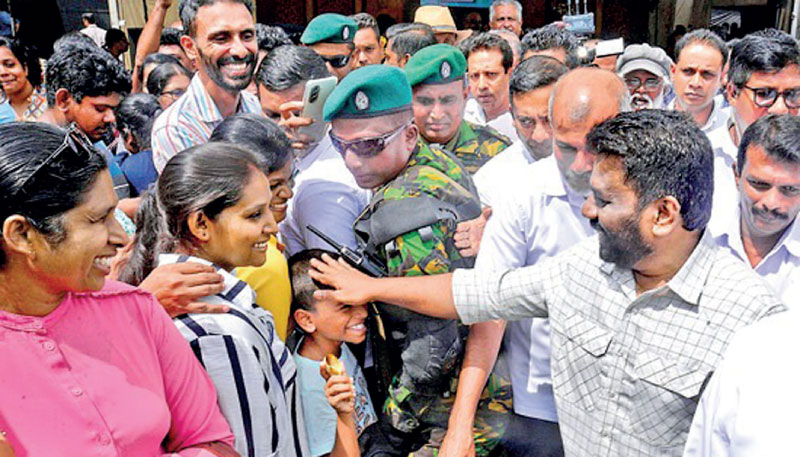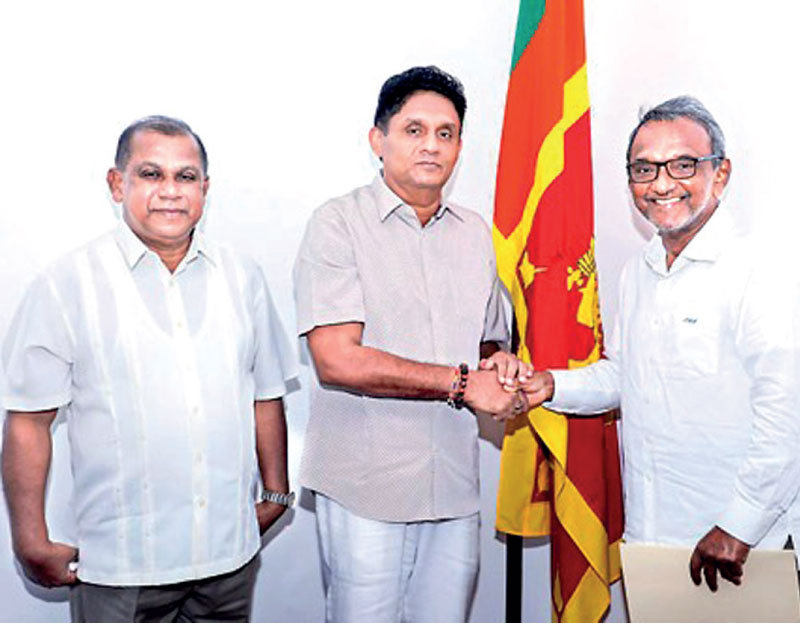Monday Feb 16, 2026
Monday Feb 16, 2026
Thursday, 3 October 2024 00:45 - - {{hitsCtrl.values.hits}}

New touch, new times

SJB’s progressive-liberal Chairman, Imtiaz Bakeer Markar
|
 Sri Lanka has the best chance of a win/win scenario it has had since 2009 when we won the war.
Sri Lanka has the best chance of a win/win scenario it has had since 2009 when we won the war.
In my columns (and sporadic TV and YouTube appearances) early this year on the elections, I made three points.
 We should grasp the chance for a generational change of national leadership with Anura and Sajith.
We should grasp the chance for a generational change of national leadership with Anura and Sajith.
 We should end a long dark chapter in our contemporary history by electorally exorcising Ranil Wickremesinghe.
We should end a long dark chapter in our contemporary history by electorally exorcising Ranil Wickremesinghe.
 While we can decide between Anura and Sajith as President closer the election (I opted for Sajith), we have a golden opportunity because we have two able young leaders and two jobs available: Presidency and Prime Ministership. Whoever we opt for as President, we can opt for the other as PM and secure the benefit of the strengths of both for Sri Lanka.
While we can decide between Anura and Sajith as President closer the election (I opted for Sajith), we have a golden opportunity because we have two able young leaders and two jobs available: Presidency and Prime Ministership. Whoever we opt for as President, we can opt for the other as PM and secure the benefit of the strengths of both for Sri Lanka.
With the Parliamentary election, we have the last chance to make Sajith the PM in the interests of convergence of modernising reform traditions (leftist and populist-centrist) and balance of the polity.
AKD’s modernity
People often ask me why, despite a half-century of intense political engagement, I have never “entered politics”, by which they mean mainstream electoral politics, Parliament, a Cabinet portfolio.
There was a philosophical reason: I am drawn much more to Carl Schmitt’s ‘the political’, and Sartre’s political ‘projects’ than to the electoral politics of politicians. I prefer what the French call Le Politique to La Politique.
There’s a much simpler reason too. That’s why I declined President Premadasa’s invitation of a portfolio via the National list (he complained to my father about my refusal). I could not abide, had a visceral detestation towards, the ornate, theatrical, time-consuming, pre-modern rituals of state and governance in Sri Lanka.
President Anura Kumara Dissanayake has had the cultural courage to do what seemed impossible: cut through much of the ritual. His rolled-shirtsleeves style reminds me of the informality, matter-of-fact nature, and sheer brevity on the part of Singaporean politicians including the highest, that I witnessed during my year at an NUS think-tank.
Anura is saving time, money and energy. His streamlined, rational praxis is very good indicator of the positive potentialities of his tenure, because you cannot have authentic modernisation while maintaining backwardness in the very culture and ethos of governance and administration.
|
Imtiaz Bakeer Markar
Sajith Premadasa’s appointment of Imtiaz Bakeer Markar as SJB Chairperson is important and apposite. Imtiaz represents civility and progressive liberal values in politics.
A second generation UNPer (his father was a respected Speaker of Parliament) he was in the founding core of the SJB together with Sajith, Tissa Attanayake and Ranjith Madduma Bandara because he perceived that the liberal-progressivism that formed an important aspect of the UNP tradition simply could not be represented by that party under the ultra-capitalist and crony-capitalist, arrogant, socially-impaired leadership of Ranil Wickremesinghe. He knew Ranil would never be popularly elected President.
Imtiaz rose in the UNP during the dramatic egalitarian-meritocratic transformation of the party in the Opposition (1973-1977) under JR Jayewardene and R. Premadasa, which displaced the patrician patriarchs. He achieved his peak during the Premadasa presidency. He was then marginalised during Ranil’s decades-long (and still ongoing) leadership because he fought for the UNP’s reform and supported Deputy Leader Sajith’s democratisation efforts.
As a teenager Imtiaz was handpicked by UNP Opposition parliamentarian R. Premadasa to head the youth wing of the populist Puravesi Peramuna, the Citizens’ Front, a dissident UNP offshoot.
Decades later when President Premadasa handed the Housing Ministry to his closest-comrade-in-arms Sirisena Cooray, he did so having chosen Imtiaz as Deputy Minister and telling him to take care of the “baby which [he] had nurtured” (the Ministry and the Housing programs).
Imtiaz’s social democratic ‘progressive UNP-ism’ is the only interpretative-ideological framework that can orient any successful rapprochement between the SJB and the UNP under Sajith’s leadership.
When Imtiaz speaks in Parliament there is no heckling, only pin-drop silence from the other side. Even Mahinda Rajapaksa listens attentively.
Big bad ideas
There are two big ideas out there which are perceived as alternatives. One is very bad, the other is too but is rectifiable.
Conventional wisdom holds that the NPP needs a two-thirds majority at the parliamentary election to strengthen President AKD’s hand and his reform drive.
Those who oppose the NPP oppose the idea of a two-thirds majority, and hold that the only barrier to such an outcome is an alignment between the UNP and Sajith’s SJB, without which a two-thirds majority seems unstoppable.
The first proposition – the desirability of a two-thirds majority--is wrong in an absolute sense. The second – an SJB-UNP bloc--is decidedly wrong without Ranil exorcised, but can be made right by de-Ranilisation.
The idea of a two-thirds majority is a bad one irrespective of whether or not you support AKD and the NPP. It is a dreadful idea if you support AKD and the NPP. It is a no less dreadful idea if you oppose them.
Why so? Because of facts, evidence, the historical record. Those facts are massive, incontrovertible, and cover both scenarios—having a two-thirds majority and not having one.
Reviewing the “76 years since Independence” often denounced by President AKD, it is easy to observe the results:
 DS Senanayake: He didn’t enjoy a two-thirds majority. He remains perhaps the most respected and one of the most high-achieving of our leaders.
DS Senanayake: He didn’t enjoy a two-thirds majority. He remains perhaps the most respected and one of the most high-achieving of our leaders.
 SWRD Bandaranaike: His tragic assassination had nothing to do with the absence of a two-thirds majority. With his simple majority in Parliament he effected great changes, placing the country on a progressive path in international relations and socioeconomic policy.
SWRD Bandaranaike: His tragic assassination had nothing to do with the absence of a two-thirds majority. With his simple majority in Parliament he effected great changes, placing the country on a progressive path in international relations and socioeconomic policy.
 Sirimavo Bandaranaike (1960-1964): Her first administration had a simple majority, and saw significant progressive achievement.
Sirimavo Bandaranaike (1960-1964): Her first administration had a simple majority, and saw significant progressive achievement.
 Dudley Senanayake: His terms in office always had a simple majority, but he did little harm and was dearly loved (as evidenced at his funeral in 1973).
Dudley Senanayake: His terms in office always had a simple majority, but he did little harm and was dearly loved (as evidenced at his funeral in 1973).
 Ranasinghe Premadasa: He didn’t secure a two-thirds majority. His achievement as a development President is hailed by economists and ensures that his framed photograph is still held high by crowds at election meetings and the mention of his name and programs generate waves of wild applause.
Ranasinghe Premadasa: He didn’t secure a two-thirds majority. His achievement as a development President is hailed by economists and ensures that his framed photograph is still held high by crowds at election meetings and the mention of his name and programs generate waves of wild applause.
 Chandrika Bandaranaike Kumaratunga: She won the presidency by a record margin under unique tragic circumstances, but failed to secure a two-thirds majority in Parliament. Despite her many blunders, public opinion is negative-to-neutral. She’s no hate-symbol.
Chandrika Bandaranaike Kumaratunga: She won the presidency by a record margin under unique tragic circumstances, but failed to secure a two-thirds majority in Parliament. Despite her many blunders, public opinion is negative-to-neutral. She’s no hate-symbol.
 Mahinda Rajapaksa (2005-2009): His historic achievement, which still makes him a much-loved figure and has endowed his son Namal with a legacy that can serve as start-up political capital, wasn’t through a two-thirds parliamentary majority. Mahinda beat the LTTE and won a thirty-year war, which several predecessors couldn’t, with a simple majority in Parliament.
Mahinda Rajapaksa (2005-2009): His historic achievement, which still makes him a much-loved figure and has endowed his son Namal with a legacy that can serve as start-up political capital, wasn’t through a two-thirds parliamentary majority. Mahinda beat the LTTE and won a thirty-year war, which several predecessors couldn’t, with a simple majority in Parliament.
That’s the overwhelming evidence of Sri Lanka’s largely positive experience with administrations with a simple majority in the legislature.
There’s even more glaring evidence of the Sri Lanka’s disastrous experience with administrations which enjoyed a two-thirds majority in Parliament.
 Sirimavo Bandaranaike (1970-1977): her United Front government of the SLFP and its coalition partners, the Marxist Left parties the LSSP and CPSL secured a 2/3rds majority and was one of the most disastrous in our history. The Left was wiped out in 1977, it took 17 years for the electorate to forgive her and the SLFP, even then she was never re-elected to the island’s leadership.
Sirimavo Bandaranaike (1970-1977): her United Front government of the SLFP and its coalition partners, the Marxist Left parties the LSSP and CPSL secured a 2/3rds majority and was one of the most disastrous in our history. The Left was wiped out in 1977, it took 17 years for the electorate to forgive her and the SLFP, even then she was never re-elected to the island’s leadership.
 JR Jayewardene: His presidency was backstopped by a 5/6ths majority in the House. His traumatic tenure was a decade characterised by twin civil wars and foreign military intervention.
JR Jayewardene: His presidency was backstopped by a 5/6ths majority in the House. His traumatic tenure was a decade characterised by twin civil wars and foreign military intervention.
 Mahinda Rajapaksa (2010-2015): He managed a two-thirds majority in his postwar second term, amended the Constitution to run for a third term, and lost the President election of 2015, never to return to the country’s leadership.
Mahinda Rajapaksa (2010-2015): He managed a two-thirds majority in his postwar second term, amended the Constitution to run for a third term, and lost the President election of 2015, never to return to the country’s leadership.
 Gotabaya Rajapaksa: His truncated term was our last, most recent experience of a President with a parliamentary supermajority. We know how grotesque that was and how dramatically he was overthrown.
Gotabaya Rajapaksa: His truncated term was our last, most recent experience of a President with a parliamentary supermajority. We know how grotesque that was and how dramatically he was overthrown.
For roughly two decades (1970-1989), Ceylon/Sri Lanka lived under two consecutive administrations, one centre-left, the other centre-right, led by Sirima Bandaranaike and JR Jayewardene respectively, which possessed a two-thirds majority in Parliament. Those nearly 20 years were the most bloodily nightmarish in our country’s modern history.
Why would any rational person want President AKD and his NPP to win a two-thirds majority in Parliament when it inevitably leads to a bad end?
|
AKD needs presidency
President Dissanayake is already structurally vulnerable because of his status as a minority president, unable to vault the 50% mark, which as Maryland-based political scientist Prof Keethaponcalan concurs, is unique in the history of Sri Lanka’s Presidential politics. (https://www.colombotelegraph.com/index.php/dissanayake-the-minority-president/)
Leftwing presidencies throughout the world which fail to secure a majority and gain only a plurality of votes, are strategically flawed, which is why Marxist political leaders and strategists around the world argue strongly for a broad united front as the ONLY method by which a Left Presidential candidate ever vaults the 50% mark.
I had repeatedly pointed that out to the dismay and disdain of the JVP-NPP. Anura’s 42% vote proved me right about the scientific, objective laws of left politics.
AKD’s 42% --a plurality--cannot be offset by a supermajority in parliament. Such a supermajority is a timebomb waiting to explode. Under a ‘minority President’, that explosion will be inevitable and destructive. World history shows that a bad end for a leftwing leader is usually far worse than for a rightwing or centre-right one. That’s unfair, but that’s how it goes--which is why any sympathiser of the country’s ongoing left experiment must not wish for a two-thirds majority in Parliament.
I propose a superior, safe substitute for a parliamentary supermajority: RETAIN, revise and reform the executive Presidential system. DON’T abolish it.
AKD needs the powers of the executive presidency for stability in a system with proportional representation.
What would be optimal and safest for President Dissanayake is a triangular combination:
(1) A simple majority in Parliament.
(2) Retention of the Presidential system, rebalanced, reformed.
(3) Retention of the Open Economy and globalisation, with internal rebalancing for greater equity and external diversification of sources of dependence.
A 2/3rds majority has been an unfailing source of conflict and catastrophe. It unbalances the political system. Anything and everything that is unbalanced, capsizes, falls.
Mr. Kryptonite
If one adds the votes that Ranil Wickremesinghe got, to the votes—twice in number—that Sajith Premadasa got, it amounts to a clear majority. It is argued that an SJB-UNP realignment could prevent a 2/3rds majority for AKD-NPP at the upcoming parliamentary election and is the only way of doing so.
In actuality, far from being a pathway of preventing a 2/3rds majority for the incumbent, an SJB-UNP alliance could paradoxically bring that JVP-NPP supermajority closer.
Each election has its own context and content. What constitutes the context and content of the Parliamentary election scheduled for November 14th 2024?
The context is the victory of the leftwing Anura Kumara Dissanayake as President and the argument that the positive effects of that victory be endorsed and reinforced in the strongest possible way with a hyper-majority at the Parliamentary election.
The content of November 14th will be the electoral elimination of the discredited old political Establishment and much of the party-political superstructure.
The three decades-long (1994-2024) rule of the SLFP-SLPP is going to end in disintegration and disappearance, with Namal Rajapaksa and his faction the sole survivors.
The electoral elimination of the oldest component of the old Establishment—the UNP--was already prefigured in Feb 2018 when it was reduced to 23% of the vote, while the ruling party. It won zero seats in August 2020.
The UNP and SLFP-SLPP wings of the establishment united in support of Ranil Wickremesinghe at the Sept 2024 Presidential election. They expected to win, but despite the advantages of incumbency, came third. It was enormously obtuse to assume that a man who ran for the Presidency twice and lost, would win on his third attempt, having just implemented a harsh austerity program.
So far, Sajith Premadasa and his SJB together with their ally the Samagi Jana Sandhanaya, have escaped this process of elimination and are the only survivors of the old democratic establishment.
Any alliance with the UNP will paint a target on the SJB’s back and walk it right into the line of fire of the citizens’ electoral firing-squad. Imagine the SJB-SJS’s vibrant stage cluttered by Ranil Wickremesinghe and/or his ‘basket of deplorables’ Ashu Marasinghe, Vajira Abeywardena, Sagala Ratnayaka, Daya Gamage, et al.
After Ranil’s suicide-bomber candidacy defeated Sajith Premadasa and installed AKD, why would or should the SJB accommodate renegades Thalatha Athukorala, Rajitha Senaratne, Harin Fernando and Manusha Nanayakkara?
In November 2019, the appearance of Ranil on Sajith’s Galle Face stage shaved several percentage points off the UNP candidate as did Ranil’s claim that he would be the PM in the event of Sajith’s victory and the sporadic planting of Ranil placards at some public meetings.
In November 2024, why should the SJB compromise itself by association with Ranil’s UNP, with or without its discredited SLFP-SLPP allies?
Without them, the SJB will look at least like a newish democratic alternative to the new NPP establishment.
Is there any formula which permits an SJB-UNP rapprochement? Yes. Ranil Wickremesinghe must immediately resign from all posts and membership in the UNP, transferring leadership to Ruwan Wijewardena.
The more direct way of uniting the SJB and UNP vote bases, while recognising the latter is a fraction of the former --even Ranil’s 17% wasn’t a UNP vote but a UNP-SLPP-SLFP one-- is to transfer UNP leadership unconditionally to Sajith Premadasa.
The simplest of all methods for SJB-UNP convergence is for Sajith-SJB-SJS to appeal over the heads of the UNP-SLPP leaders, directly to those who wasted their votes on Ranil, reminding them that option has been deleted with no chance of even coming second. A vote for a dead-end UNP-SLPP slate is a vote for a two-thirds majority for the JVP-NPP.
|
System and Kryptonite
Ranil is Mr. Kryptonite. During, because of, and in reaction to his 30 years as UNP leader, i.e., as a direct result of his leadership and/or association with it:
(I) The UNP, SLFP and SLPP were destroyed.
(II) Sri Lanka produced the crazy Sinhala-Buddhist chauvinist Gotabaya presidency.
(III) Sri Lanka faces the danger of a parliamentary two-thirds majority for the JVP-NPP, causing a political monopoly to descend, with regional ripple-effects.
Logically therefore, preventing a parliamentary supermajority and rebalancing the polity requires immediate de-Ranilisation.
Anyone wishing to avoid facing the eventual geopolitical/geostrategic question “who lost Sri Lanka?” should have induced Ranil off the board. Though belated, they should get him out of the equation now.